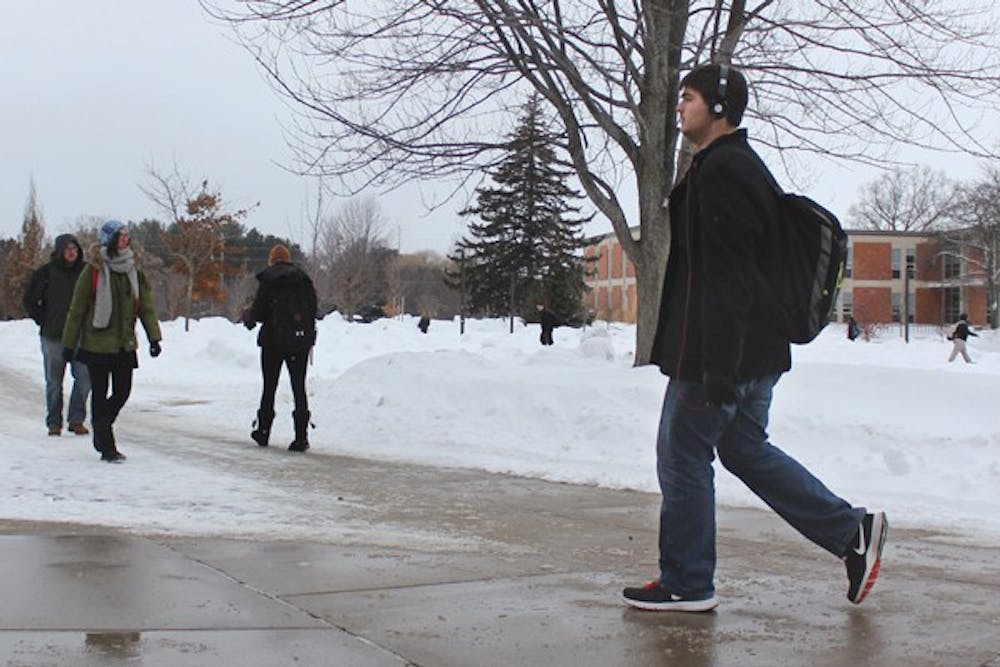Closing campus no easy task for university officials

Making the decision to close Central Michigan University during inclement weather is not as straight-forward as most students think.
"Every situation is different," said Barrie Wilkes, vice president of Finance and Administrative Services. "We determine if the campus is in a condition where we can safely hold classes."
At CMU, the decision to close campus rests on the shoulders of Wilkes, along with CMU Police Chief Bill Yeagley and Stephen Lawrence, associate vice president of Facilities Management.
If inclement weather looks menacing, Wilkes will receive a call from Lawrence at 5 a.m. This phone call acts as an update from Lawrence about the condition on campus.
"A delay might occur if campus is not ready to hold classes at the start of the day, but can be ready to hold classes later in the day,” Wilkes said.
Lawrence then assess which type of inclement winter weather could most affect the efficiency and safety on campus: Ice, snow, or in the case of CMU’s last closing, the temperature.
"If it's a big, heavy, wet snow versus a light fluffy snow, it makes a difference as far as how easy it is to plow and move,” Lawrence said.
Icy roads, however, do not usually lead to a delay or cancellation.
"If we have freezing rain then we'll think long and hard about it,” Wilkes said. "We wouldn't normally close just because it's icy.”
According to the university policy for closing and delaying classes, a decision is supposed to be made no later than 6 a.m. – university officials try to make this decision as close to 6 a.m. as possible.
"A decision is very seldom made before 6 a.m.,” Lawrence said.
Wilkes said the decision to close comes down to whether or not the university is serving its student to the fullest potential.
"Students are paying a lot of money for an education and we owe it to them to be here,” he said.
If a decision to close campus, delay or cancel classes is made, Wilkes will notify both University President George Ross and Steve Smith, director of public relations.
Another consideration in closing the building and canceling or delaying classes is the ever-changing weather patterns of the state as a whole.
"While weather forecasts have changed over the years, this is still Michigan and things change rapidly," Wilkes said. "We try to wait to decide.”
When CMU officials closed the school for dangerous temperatures, it did so at 11 p.m., well before their stated 6 a.m. deadline. Many students, upon hearing the news, took advantage of the day off by hitting their favorite nighttime hot spots.
The bar scene in Mount Pleasant, while not a determining factor when deciding to close campus at a specific time, is definitely a consideration for Yeagley and his department.
"That certainly crosses my mind,” Yeagley said. “Certainly for me I understand the environment in which we live. And so, yes, I think about that. Does it influence the outcome of the decision? I’m not sure that it does. I worry about it, to be candid. If we close early, I know that raises the potential for issues and we better be prepared to deal with those challenges.”
Similarly, delaying or canceling classes is not usually influenced by the decisions at other universities.
"It's certainly something that we're mindful of, especially in the situation of cold temperatures,” Wilkes said. "For a snow storm, that can vary greatly between here and Ann Arbor.”
Lawrence, Wilkes and Yeagley all agree that each student and faculty member should use their best judgment when determining to come to campus.
"Personally, when I'm looking at closing the school, it's not about the university losing money or making money. That has never crossed my mind," Wilkes said. "It really is a safety issue and can we adequately provide an environment where students and faculty and staff are safe coming to work and that’s kind of balanced with the desire to be open if we in any way can safely do it. But money doesn't enter into the decision.”



